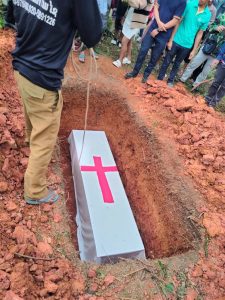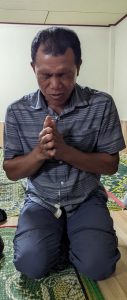Source: www.morningstarnews.org
Date: November 14, 2022
Christian was leader of officially recognized church.
By Our Asia Correspondent

Burial of Pastor Seetoud on Oct. 24, 2022. (Morning Star News)
Laos (Morning Star News) – The body of a pastor with an officially recognized church in Laos was found last month with signs that he was tortured and killed for his faith, area sources said.
Christian leaders and police in central Laos’ Khammouane Province believe Pastor Seetoud, who went by a single name, was killed for spreading the gospel amid rapid church growth in the country.
The pastor had been expected to attend a meeting of Christians on Oct. 20 in Thakhek, about 100 kilometers (62 miles) from his home in Don Keo village, Nakai District, Khammouane Province, a journey of three and a half hours on his motorbike. When he failed to arrive more than three hours after the start time for the meeting, more than 20 people searched for him on the mountain pass near Don Keo village and at a local hospital, without success.
The search party also obtained CCTV footage from a local store owner in nearby Nakai showing that Pastor Seetoud on Oct. 21 dropped off a plastic gas container that he intended to pick up later, area Christians said.
An area resident later found Pastor Seetoud’s body in a ditch off a mountainous jungle road near the village and uploaded photos of the scene to Facebook, enabling the search party to find the corpse on Oct. 23.

Pastor Seetoud of Don Keo village, Khammouane Province, Laos, was last seen on Oct. 20, 2022. (Morning Star News)
Two Christians who had planned to leave their village and join Pastor Seetoud for the meeting in Thakhek said he was delayed because two unidentified officials questioned the church leader about his activities and reasons for travel to the town.
A witness from nearby Wangheen village told villagers that he stopped on the road when he saw a black truck with no license plates on Oct. 20, the day the pastor headed for the meeting. He said three men got out and seized another man, violently dumped him into the truck and drove away.
The witness said he assumed the authorities were arresting a drug dealer/criminal and decided to continue his journey. When he later heard about Pastor Seetoud’s death, he told villagers that it was the pastor who was abducted.
Christian leaders said Pastor Seetoud’s body was severely disfigured and showed signs of torture. The search party found Pastor Seetoud’s Bible near his body and his motorcycle nearby on the road.
He leaves behind a wife and eight children, the youngest a 1-year-old. Pastor Seetoud led a congregation of the Lao Evangelical Church, one of three officially recognized denominations in Laos along with the Seventh-day Adventist Church and the Roman Catholic Church.
Christian leaders said provincial police have told them Pastor Seetoud was likely killed because of his faith. Police officials at the provincial level suspect local officials at the district level killed him, according to LEC leaders.
“No words can describe the pain that Seetoud’s family and the local churches are experiencing,” a Laotian evangelical leader said. “The great injustice about the whole situation is that those in authority were either directly or indirectly involved in Seetoud’s murder.”
In recent months, relatives and neighbors had followed Pastor Seetoud and threatened him with harm if he continued to share his Christian faith, according to Christian leaders. His frequent trips to Thakhek were monitored, and since July he received warnings from village authorities to stop his Christian activities, the church leaders said.
His body was taken to a hospital where family and church friends identified him. Several Lao Evangelical Church leaders and members of his congregation attended his funeral on Oct. 24, despite fear of persecution. After the funeral, family and Christians in Don Keo village held a memorial service in his home.
Thakhek provincial and district police have started an investigation into Pastor Seetoud’s death and questioned two leaders of his church for three hours, Christian leaders said.
After COVID-19 restrictions were relaxed this year, Pastor Seetoud began making more frequent trips to Thakhek as Christians had resumed helping one another care for families, taking relatives to the hospital, obtaining farm supplies, carrying out farm business and organizing holiday events.
The Lao Evangelical Church is assisting his relatives, whose long-term needs include trauma counseling, food, shelter and rebuilding of homes.
Pastor Seetoud had an official Lao Evangelical Church card and was recognized as a Bible Teacher/Trainer. On the Sunday before he was killed, he had celebrated Communion with the church in his home.
Past Persecution
Pastor Seetoud made his living as a subsistence farmer.
In 2015, he and his family left their animistic beliefs behind and put their faith in Christ. As often happens in rural Laos, in response to his conversion village authorities and local police asserted that Christianity was incompatible with traditional beliefs and cultural practices.
Pastor Seetoud, his family and other Christians were denied access to drinking water and other basic rights. Authorities tried to force him to sign an affidavit recanting his faith, as they were concerned with church growth and did not want the “foreign religion of Jesus” to interfere with local worship of idols and spirits, area Christians said.
A 2016 decree on religion empowers the Ministry of Home Affairs to stop any religious activities contrary to policies, “traditional customs,” laws or regulations, though much persecution of Christians in Laos is carried out by local officials acting outside of the law and the constitution, which guarantees religious freedom. The U.N. International Covenant on Civil and Political Rights, ratified by Laos in 2009, upholds the right to adopt a religion/belief of choice as well as the right to manifest that religion/belief in a corporate worship (Article 18).
About 60 percent of Laos’ population is Buddhist and 32 percent animist, with the ancestral spirit worship of animism also finding its way into Buddhists’ beliefs and practices.
In 2018, local police handcuffed and detained Pastor Seetoud in the village school for three days for hosting a church service in his home. Though the home services had been going on for more than three years, he was accused of holding an “illegal gathering,” area Christians said.
Pastor Seetoud was released after provincial police, who oversee village and district police, were notified, and the pastor paid a fine. Continuing to hold church services in his home, he developed stronger ties with Christians from the Lao Evangelical Church (LEC).
The LEC of Khammouane Province has a physical church in Thakhek, and church members and families meet in homes all throughout the province.
Growing Dangers
Persecution of Christians in Laos has increased in the past two years, particularly in the southern part of the country.
Christian leaders in Laos believe this is a dangerous time for believers because of rapid church growth. Despite COVID-19 lockdowns in 2021, ministry leaders in Khammouane Province said they baptized thousands of people and planted more than 60 churches.
Local church leaders said they are being watched and are living in fear for their lives.
“All the believers still love God and are determined to follow him,” a local leader who is part of Pastor Seetoud’s church told ReligionUnplugged.com.
A national ministry leader said nothing can stop the growth of the church.
“We weep but not like those without hope,” he said. “We know that in Christ we are secure. Attacks such as this have happened before in our country, and each time the kingdom of God has grown.”
In February 2021, villagers attacked 12 members of a Christian family in Dong Savanh in southern Laos and drove them from their home; previously, in 2017, the family had been expelled from their village.
Also in February 2021, Cha Xiong, an ethnic Hmong Christian community leader, was shot and killed. A villager found his body on a roadside the next day. Local authorities said they still have no suspects.
A month later, Pastor Sithon Thippavong, a Lao leader in Savannakhet, was arrested for refusing to sign a document renouncing his Christian faith, and was later jailed for a year on charges of “disrupting unity” and “creating disorder.”
In October 2020, authorities expelled and destroyed the homes of seven Christians in Saravan Province’s Ta Oy District for refusing to recant their faith. Two years earlier, four Lao Christians and three Christian leaders were detained for seven days in Savannakhet’s Phin District for celebrating Christmas “without permission.”
Officials in rural areas view Christians with suspicion and arbitrarily detain, harass and expel them from their villages for refusing to renounce their faith. Christians’ property is then confiscated, with local officials turning a blind eye to the abuse while higher government officials deny that Christians suffer any discrimination or violence.
According to the Lao constitution’s Article 43, citizens have the right to “believe or not to believe in religions.” The government officially recognizes four religions – Buddhism, Christianity, Islam, and the Baha’i faith – but gives priority to Buddhism.
The Ministry for Home Affairs and the Lao Front for National Development strictly regulate all religious institutions. Christianity is often viewed as a Western religion and is closely monitored.
In 2019, the Laotian government issued Decree 315 on religious freedom, which stipulated, “All Lao citizens have equal rights before the law regarding the belief or non-belief in religion as stipulated in the constitution, law, and regulation of Lao PDR [People’s Democratic Republic].” This stipulation is largely ignored in rural areas, where persecution is common, area Christians said.
Laos ranked 26th on Christian support organization’s Open Doors’ 2022 World Watch List of the 50 countries where it is most difficult to be a Christian.
Officially named the Lao People’s Democratic Republic since 1975, the country bordering Thailand, Myanmar and China, is a socialist, authoritarian one-party state.
